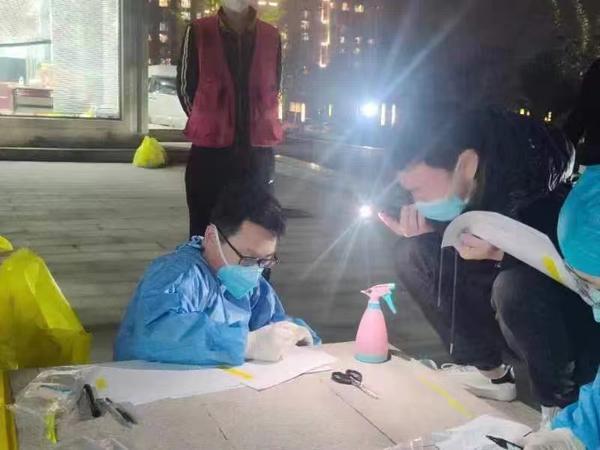In the annals of modern history, few events have wrought such profound and far-reaching changes as the COVID-19 pandemic. This global health crisis has not only reshaped our daily lives but also underscored the importance of collective action, scientific collaboration, and community solidarity in the face of adversity. As we continue to grapple with the ongoing pandemic, it is imperative that we engage in robust COVID-19 pandemic control宣传, emphasizing the significance of personal hygiene, social distancing, vaccination uptake, and the role of governments and international organizations in coordinating our efforts.
Personal Hygiene: The First Line of Defense
At the individual level, maintaining personal hygiene remains the most fundamental measure in preventing the spread of COVID-19. This includes frequent hand washing with soap and water for at least 20 seconds, using alcohol-based hand sanitizers when soap and water are unavailable, and avoiding touching one's face with unwashed hands. Additionally, wearing face masks in public spaces, especially in areas with high transmission rates, is crucial to reduce the risk of asymptomatic transmission.
Moreover, covering coughs and sneezes with a tissue or elbow (rather than the hand) and avoiding close contact with those who are sick are simple yet effective strategies that can significantly contribute to slowing down the spread of the virus. It is essential to educate the public on these basic yet vital hygiene practices, ensuring that they become second nature in our daily lives.
Social Distancing: A Critical Strategy for Slowing the Spread
Social distancing measures, including staying at home whenever possible, avoiding crowded places, and maintaining a physical distance of at least six feet from others, have proven to be effective in flattening the curve of COVID-19 infections. These measures not only reduce the number of encounters between individuals but also buy time for healthcare systems to prepare and for scientific research to progress.
Governments have implemented various forms of lockdowns and curfews to enforce social distancing, and it is crucial that citizens comply with these measures. However, it is equally important to recognize that these restrictions can have severe economic and mental health consequences. Therefore, a balanced approach that prioritizes public health while mitigating the impact on livelihoods is necessary. This might involve a phased approach to easing restrictions based on vaccination rates, testing capabilities, and hospital capacity.
Vaccination: The Pathway to Normalcy
Vaccination is widely recognized as the most potent tool in our arsenal against COVID-19. As vaccines become available, it is essential to prioritize their distribution equitably across different populations and ensure that vulnerable groups, including the elderly and those with pre-existing conditions, are vaccinated first. The global vaccination effort must be accelerated, with an emphasis on collaboration between countries to share resources, technologies, and knowledge.
The success of vaccination campaigns hinges on public trust and confidence in the safety and efficacy of the vaccines. Governments and health authorities must provide transparent information about the vaccines' development, manufacturing processes, and clinical trials results. Addressing misinformation and disinformation through credible sources is also crucial to maintain public confidence in vaccination programs.
Role of Governments: Leadership and Coordination
Governments play a pivotal role in COVID-19 pandemic control. They must establish clear policies on testing, tracing, treatment, and vaccination while ensuring that these measures are implemented effectively at local levels. Transparency in communication is vital to maintain public trust and build a sense of collective responsibility towards the pandemic response.
Governments should also invest in public health infrastructure, including strengthening healthcare systems, improving access to clean water and sanitation facilities, and promoting digital literacy to facilitate remote working and learning. This will not only help mitigate the impact of future pandemics but also enhance overall public health preparedness.
International Cooperation: A Global Effort Against a Global Threat
The COVID-19 pandemic knows no borders; it affects us all equally. Therefore, it is imperative that countries work together to share information, resources, and expertise on a global scale. The World Health Organization (WHO) has been at the forefront of coordinating this international effort, providing guidance on best practices for pandemic control and advocating for equitable access to vaccines and treatments worldwide.
International organizations must continue to play a central role in facilitating cooperation among nations, addressing vaccine nationalism, and ensuring that no country is left behind in this global fight. Additionally, strengthening global health security mechanisms and improving surveillance systems can help prevent future pandemics from spreading uncontrollably across borders.
Conclusion: A Collective Responsibility for a Common Future
The COVID-19 pandemic has underscored the interconnectedness of our world and the need for collective action in addressing global challenges. As we continue to navigate this crisis, it is essential that we remain vigilant in our efforts to control
转载请注明来自爬爬百科,本文标题:《全球抗疫,共同行动的呼唤》












 京ICP备11000001号
京ICP备11000001号
发表评论